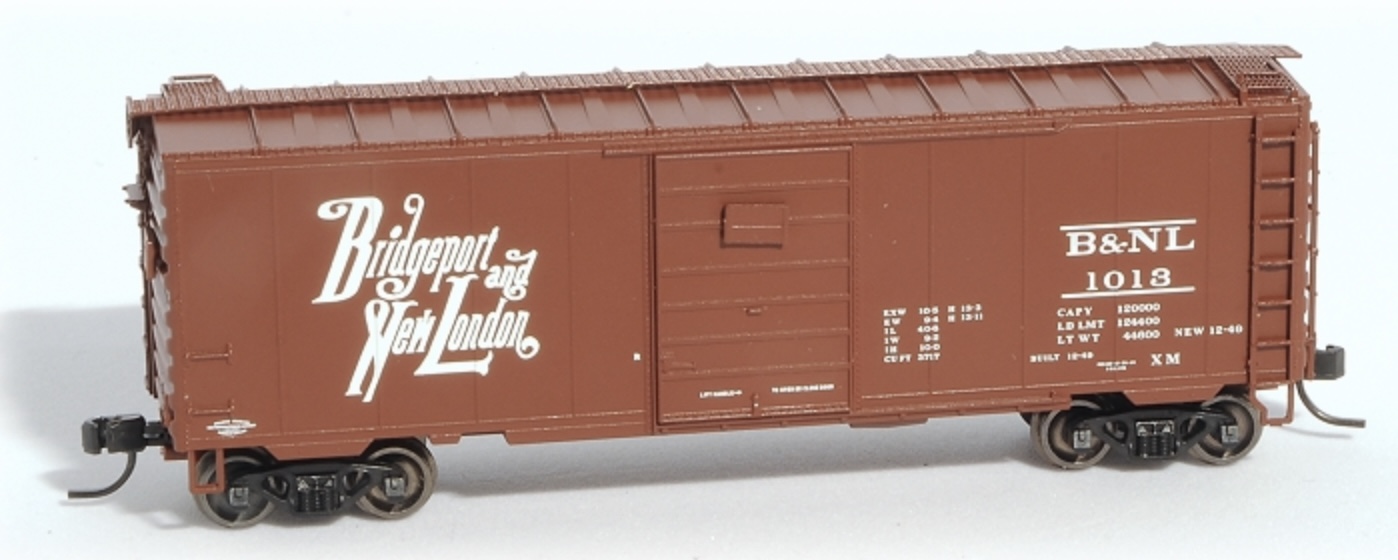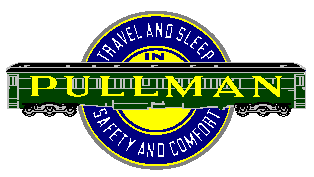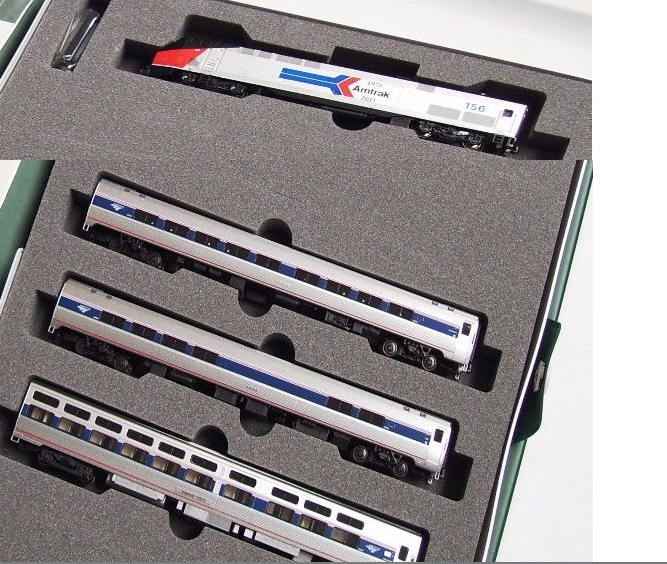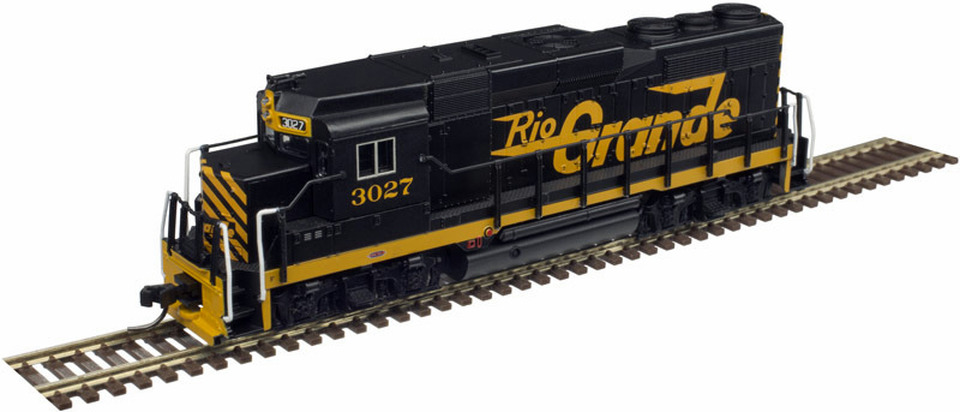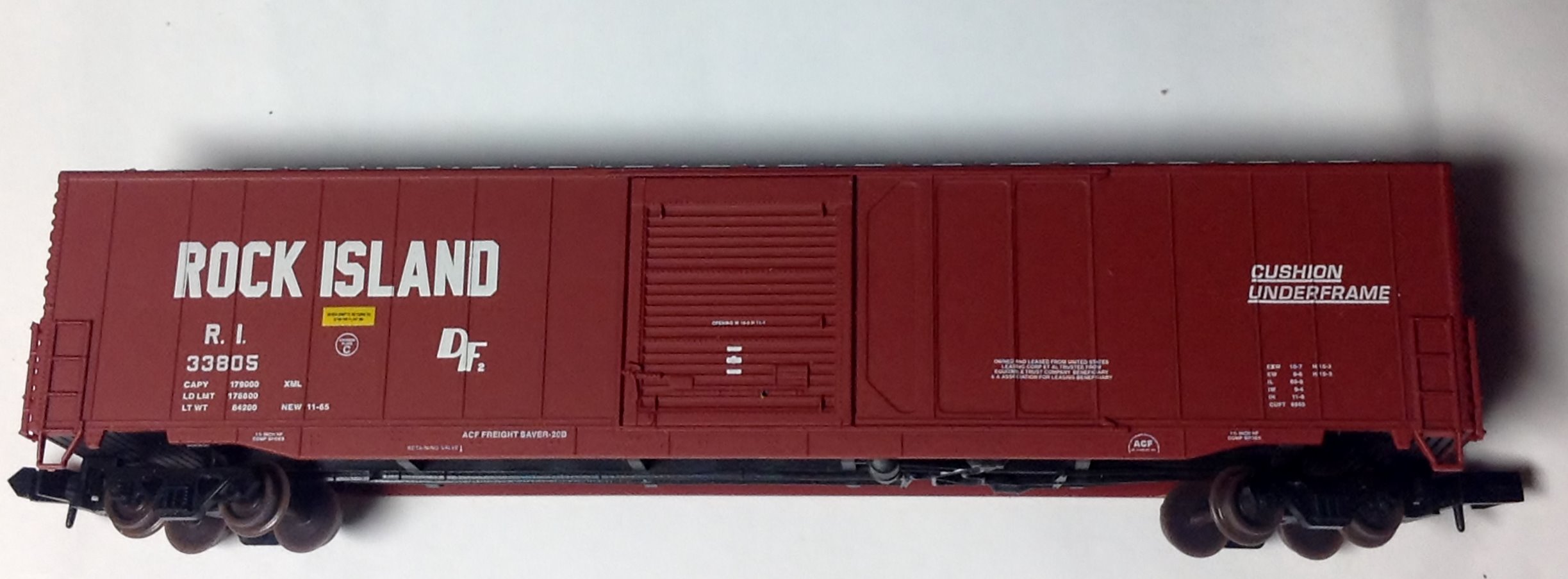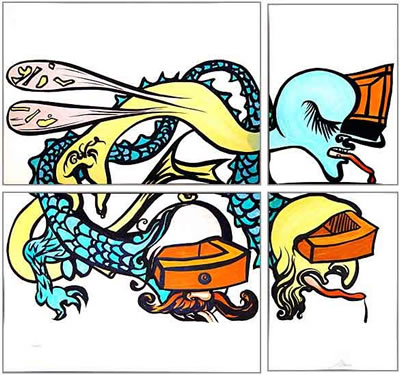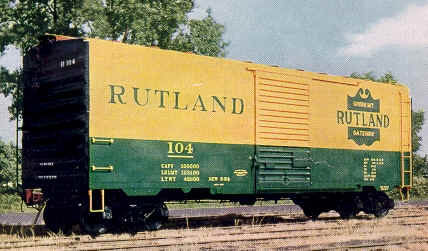Specific Item Information: Various equipment of the fictional Bridgeport & New London model railroad, a subsidiary of the New Haven. Made in China.
Model Information: This tooling was introduced by Atlas in 1976. It replaced the earlier (and very similar) model from Roco of Austria that had been imported by Atlas from 1967 until 1975. Initial production was at the New Jersey factory. Production was later moved to China. As of 2017, this model is now very long in the tooth, so recent releases have been classified as 'Trainman' (budget) product line. Newer versions come equipped with Accumate couplers. This model should not be confused with the much newer 'Master' PS-1 boxcar from Atlas which is a completely different tooling.
Similar to other Atlas models of the 1970s and 1980s, this tooling originally featured Rapido Couplers and deep-flange nickel-silver plated wheels. When production moved to China, they started appearing with plastic low-profile wheels and Accumate couplers.
Sometime after 2005, Atlas created a 'Master' version of this model, and downgraded this tooling to the "Trainman" line. The new tooling was a complete redo of the model and has body mounted couplers, metallic wheels and excellent detailing, especially of the underframe. Since these are also marketed as 'PS-1' boxcars, it can be confusing. That tooling, however is different enough that we associate those cars with a different body style.
Similar to other Atlas models of the 1970s and 1980s, this tooling originally featured Rapido Couplers and deep-flange nickel-silver plated wheels. When production moved to China, they started appearing with plastic low-profile wheels and Accumate couplers.
Sometime after 2005, Atlas created a 'Master' version of this model, and downgraded this tooling to the "Trainman" line. The new tooling was a complete redo of the model and has body mounted couplers, metallic wheels and excellent detailing, especially of the underframe. Since these are also marketed as 'PS-1' boxcars, it can be confusing. That tooling, however is different enough that we associate those cars with a different body style.
Prototype History: The 40' Boxcar is widely known as one of the most popular freight cars used by railroads as they transitioned from steam to diesel. In particular the Pullman Standard or PS-1 design was one of the most popular and was widely used by North American railroads. These boxcars were built beginning in 1947 and share the same basic design, with certain elements such as door size, door style or roof type varying among the different railroads and production years. When production of these cars ceased in 1963, over 100,000 had been produced.
So just what is a PS-1? Well the simple answer is it is any boxcar built by Pullman Standard from 1947 on. The design changed over the years – sometimes subtly, sometimes for customer request, and sometimes in a larger way. In general, most PS-1’s built from 1947 to 1961 share the same dimensions and basic construction techniques. These cars all had a length of 40′, a height of 10’5″ or 10’6″, welded sides and ends and roof of Pullman’s own design. The greatest variation was in the size and style of doors used. Pullman Standard also offered 50′ and later 60′ boxcars – also with the PS-1 designation.
So just what is a PS-1? Well the simple answer is it is any boxcar built by Pullman Standard from 1947 on. The design changed over the years – sometimes subtly, sometimes for customer request, and sometimes in a larger way. In general, most PS-1’s built from 1947 to 1961 share the same dimensions and basic construction techniques. These cars all had a length of 40′, a height of 10’5″ or 10’6″, welded sides and ends and roof of Pullman’s own design. The greatest variation was in the size and style of doors used. Pullman Standard also offered 50′ and later 60′ boxcars – also with the PS-1 designation.
Road Name History: 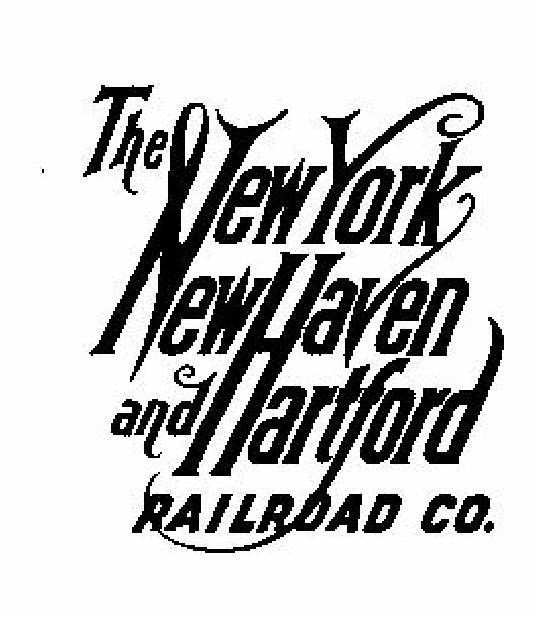 The New York, New Haven and Hartford Railroad (reporting mark NH), commonly known as the New Haven, was a railroad that operated in New England from 1872 to 1968, dominating the region's rail traffic for the first half of the 20th century.
The New York, New Haven and Hartford Railroad (reporting mark NH), commonly known as the New Haven, was a railroad that operated in New England from 1872 to 1968, dominating the region's rail traffic for the first half of the 20th century.
Beginning in the 1890s and accelerating in 1903, New York banker J. P. Morgan sought to monopolize New England transportation by arranging the NH's acquisition of 50 companies, including other railroads and steamship lines, and building a network of electrified trolley lines that provided interurban transportation for all of southern New England. By 1912, the New Haven operated more than 2,000 miles (3,200 km) of track, with 120,000 employees, and practically monopolized traffic in a wide swath from Boston to New York City.
This quest for monopoly angered Progressive Era reformers, alienated public opinion, resulted in high prices for acquisitions, and increased construction costs. Debt soared from $14 million in 1903 to $242 million in 1913, even as the advent of automobiles, trucks and buses reduced railroad profits. Also in 1913, the federal government filed an anti-trust lawsuit that forced the NH to divest its trolley systems.
The line became bankrupt in 1935, was reorganized and reduced in scope, went bankrupt again in 1961, and in 1969 was merged with the Penn Central system, formed a year earlier by the merger of the also bankrupt New York Central Railroad and Pennsylvania Railroad; Already a poorly conceived merger, Penn Central proceeded to go bankrupt in 1970, becoming the largest bankruptcy in the U.S. until the Enron Corporation superseded it in 2001. The remnants of the system now comprise Metro-North Railroad's New Haven Line, (parts of) Amtrak's Northeast Corridor, Shore Line East, parts of the MBTA, and numerous freight operators such as CSX and the Providence and Worcester Railroad. The majority of the system is now owned publicly by the states of Connecticut, Rhode Island, and Massachusetts.
Read more on Wikipedia and New Haven Railroad Historical and Technical Association, Inc.

Beginning in the 1890s and accelerating in 1903, New York banker J. P. Morgan sought to monopolize New England transportation by arranging the NH's acquisition of 50 companies, including other railroads and steamship lines, and building a network of electrified trolley lines that provided interurban transportation for all of southern New England. By 1912, the New Haven operated more than 2,000 miles (3,200 km) of track, with 120,000 employees, and practically monopolized traffic in a wide swath from Boston to New York City.
This quest for monopoly angered Progressive Era reformers, alienated public opinion, resulted in high prices for acquisitions, and increased construction costs. Debt soared from $14 million in 1903 to $242 million in 1913, even as the advent of automobiles, trucks and buses reduced railroad profits. Also in 1913, the federal government filed an anti-trust lawsuit that forced the NH to divest its trolley systems.
The line became bankrupt in 1935, was reorganized and reduced in scope, went bankrupt again in 1961, and in 1969 was merged with the Penn Central system, formed a year earlier by the merger of the also bankrupt New York Central Railroad and Pennsylvania Railroad; Already a poorly conceived merger, Penn Central proceeded to go bankrupt in 1970, becoming the largest bankruptcy in the U.S. until the Enron Corporation superseded it in 2001. The remnants of the system now comprise Metro-North Railroad's New Haven Line, (parts of) Amtrak's Northeast Corridor, Shore Line East, parts of the MBTA, and numerous freight operators such as CSX and the Providence and Worcester Railroad. The majority of the system is now owned publicly by the states of Connecticut, Rhode Island, and Massachusetts.
Read more on Wikipedia and New Haven Railroad Historical and Technical Association, Inc.
Brand/Importer Information: Eastern Seaboard Models was founded in 1987. They are a manufacturer of N scale reproductions of North American eastern railroad prototypes. The have both decorated other manufacturers' models as well as designed body styles of their own. They are located at PO Box 301, Waldwick, New Jersey 07463-0301 U.S.A.
Their 2016 lineup includes ready-to-run gondolas, well cars, hoppers, tank cars and boxcars. They also produce craftsman quality kits in their "Made in America" series. ESM products may be purchased directly from their website.
Their 2016 lineup includes ready-to-run gondolas, well cars, hoppers, tank cars and boxcars. They also produce craftsman quality kits in their "Made in America" series. ESM products may be purchased directly from their website.
Item created by: CNW400 on 2022-08-18 17:37:04
If you see errors or missing data in this entry, please feel free to log in and edit it. Anyone with a Gmail account can log in instantly.
If you see errors or missing data in this entry, please feel free to log in and edit it. Anyone with a Gmail account can log in instantly.


